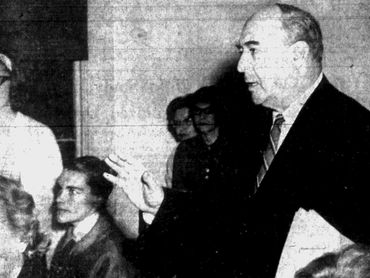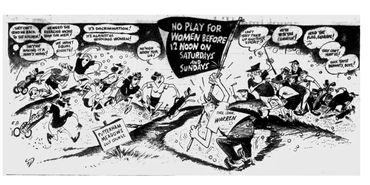Fairness on the Fairway
Throughout the 1960s and ‘70s, the women’s movement most frequently made progress through incremental gains on the local level. While feminists certainly made headlines during large-scale marches, bra-burning protests, and fiery speeches from such leaders as Betty Friedan and Gloria Steinem, real progress towards equality was usually gained through small victories in small places. The triumph of women golfers challenging the rules at the Putterham Meadows Golf Course in Brookline is a fine example of just one of those incremental steps.
In 1964, just as feminism was finding its voice nationally, a new regulation was announced at the public golf club in Brookline. Led by superintendent Dan Warren, the all-male Park and Recreation Commission announced that women would no longer be allowed to play during the most popular tee times — weekends and holiday mornings. The commission pointed to a statute that authorized them to impose “reasonable regulations” on the course.
But lady golfers — and many others around town — viewed the new edict as anything but reasonable, and soon they solicited the services of attorney Earl Auerbach. On April 18, 1964, the park commission found that their monthly meeting was considerably better attended than usual. More than 70 men and women filled a raucous room at Town Hall as Auerbach addressed the commission, complaining that the new rule would create a “dangerous precedent” and listing other towns where similar bans did not hold up in court.
Opinion in the audience was divided. One man rose to complain that women “have gabfests at the tees and hold up play,” while several women in the audience proclaimed the injustice of non-resident males being allowed on the course while women were not. In some cases, the new rule seemed to pit husband against wife. Frequent Putterham golfer Paul Rodliff announced that he played eighteen holes on a Sunday morning on the “women-less course” but that it took him all afternoon to get through nine holes when the ladies were playing. His wife Natalie then countered, asking why her husband should be allowed to play 27 holes on a Sunday when she “couldn’t even go around for 9.” One can imagine a chilly car ride home for the Rodliffs.
The hot button issue soon dominated the editorial and op-ed pages in town. On May 7, the Brookline Chronicle Citizen came down on the side of the female golfers, calling the situation, “taxation without representation,” and asking rather chauvinistically, “If lady drivers aren’t barred from the highways, why should they be barred from the greens?” Women also wrote in to the Op-Ed page, complaining about the new rule. Laurel Koufman — referring to herself in parenthesis as Mrs. Clinton N. Koufman — argued “the fact is that tax-paying citizens are denied, while male non-residents are admitted.” And Alice Silberberg, calling herself “a working girl,” praised the Chronicle, writing, “It is gratifying that such an unfair ruling has been frowned upon by your fair-minded staff.” Meanwhile, a gentleman golfer named Ambrose Page mixed fairness and sexism in equal measure, first complaining that “Women are a complete nuisance on a golf course. Powdering their shiny noses on the tee, the green, or wherever suits their fancy,” and then then affirming the right of everyone to play on a public course by calling the Putterham rule “stupid.”
Throughout the spring and fall of 1964, there were a series of moves by local authorities. The commission held a revote and (perhaps not surprisingly) agreed with itself. The Town Counsel then backed them up, as did a Norfolk Superior Court judge. But as an appeal was pending in the spring of 1965, the pressure on the commission became too great. Cutting their losses on March 11, the Commission announced that “Women will be allowed to play on the municipal course any day of the week that they choose.” It was a small victory for the feminist movement in one particular sport in one particular town, but it was also the kind of incremental nudge that pushed forward meaningful progress across the nation.



Above Left: Attorney Earl Auerbach making the case to the commission. (Brookline Chronicle Citizen)
Center: This rather ambitious cartoon in the Chronicle Citizen depicted commissioner Warren holding up the flag with the new rule as an angry mob of female golfers approached the hole. (Brookline Chronicle Citizen)
Above Right: Gentlemen golfers posing at Putterham Meadows in 1965. (Brookline Chronicle Citizen)